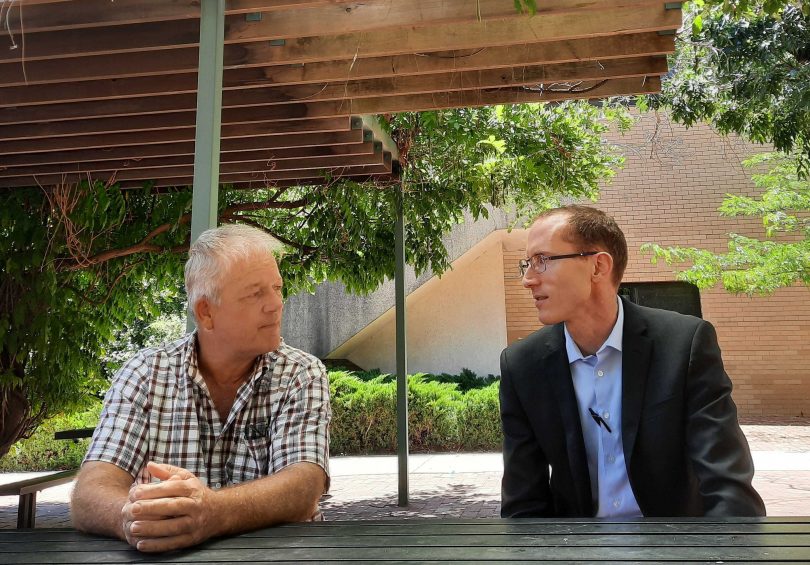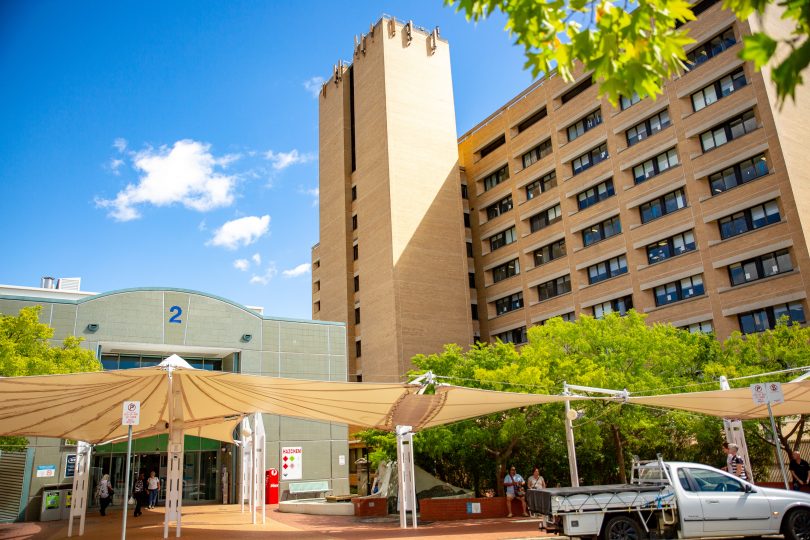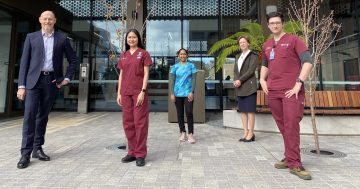
Transplant patient Peter Nieuwendyk (left) and Dr Richard Singer (right) at Canberra Hospital. Photo: Ian Bushnell.
Kidney disease sufferer and dialysis patient Peter Nieuwendyk was running out of patience and time. A kidney transplant was the answer, but there was just one problem: his weight. He had to lose 15kg to satisfy the surgeon and qualify for the transplant list.
It would be a daunting task for anyone, let alone a middle-aged man who had been on dialysis since 2016, but a relatively new initiative through the Canberra Hospital Chronic Kidney Disease Program is making lighter work of shedding kilos so patients can have a new lease on life.
Peter, from the NSW regional town of Young, had tried losing weight before, but like so many others, had failed to do so. But acquiring a new kidney and getting off dialysis, which he required every second day and pretty much restricted him to home, was a powerful motivation.
“It wasn’t the life I want,” he says. “You’re tied down full-time at home … you can’t go anywhere, do anything, you’re worried about something going wrong. It’s frustrating for family as well; it takes a toll on everyone.”
Peter also admits to being depressed.
“It was a mental thing, too, getting my head around it all,” he says.
The 15-month-old program offers a range of weight-loss approaches, but for Peter it was the psychological support which really turned around his thinking and made the difference between success and failure.
So keen was Peter to lose his 15kg that he opted for the hard and fast route of shake meal replacements, only to have to change course halfway through when it played havoc with his potassium levels.
The program dietitian then formulated a diet that worked for Peter, combined with daily walking of 30-40 minutes that saw him through the 12-week march to being transplant ready.

Canberra Hospital is an increasingly important regional health hub. Photo: File.
Peter received his new kidney in Sydney in 2020 and is now on a maintenance program – a truly lifechanging process.
He has lost a further 4kg since leaving hospital and is enjoying good meals and good health. He notes that his tastes have changed, particularly when it comes to sugar and salt.
Looking back, he believes the hospital’s program was able to explain how his body works and help him make sense of how to lose weight.
“Anyone can do shakes, but I think it was understanding it all that was the big thing for me – the way it was explained to me, and the support you got with the whole process,” says Peter.
He can call the program for help at any time, but support and encouragement from his wife and family has also been crucial.
Peter says Canberra Hospital’s role as a regional health hub is very important, with Young being a small town with limited facilities.
“The renal support clinic has been unbelievable for me,” he says.
Staff specialist Dr Richard Singer says most renal patients do struggle with weight because a lot of kidney failure now is due to excess body weight and diabetes.
But the issue of weight gain and loss is a complex area, and simply telling someone to lose 15kg is not going to work.
“It’s unreasonable to tell someone you’ve got to lose 15 per cent body weight to get a transplant,” says Dr Singer. “It’s just not going to happen. Weight loss from diet and exercise is three per cent. You’re essentially telling people, ‘We’re not going to give you a transplant.'”
He says the program explains to people why it’s difficult to lose weight, and things they can do to help but it is still very hard.
The other issue is that many patients are on medications that promote weight gain so the program looks to take them off where possible.
Dr Singer believes every hospital and medical service should have a weight management program for people who need it.
While there is a public obesity service at Belconnen, the hospital program’s focus is on patients who have a medical need to lose weight.
Dr Singer says there are many misconceptions about overweight people, and a lack of understanding about how the modern food environment affects vulnerable genetics.
“There is a lot of fat bias – that people are fat because they’re lazy or stupid – it’s rubbish,” he says.
“People may have done the wrong thing in the past, and they’re too heavy, but that’s not why they’re too heavy now.”
Programs such as this one can make a huge difference, says Dr Singer.
In 2017-2018, about 1.8 million hospitalisations involved chronic kidney disease, according to the Australian Institute of Health and Welfare.
This represents 16 per cent of all hospitalisations in Australia, and dialysis accounted for the vast majority (79 per cent) of them.
Chronic kidney disease contributed to 11 per cent of all deaths in Australia in 2018, around 16,800.
















